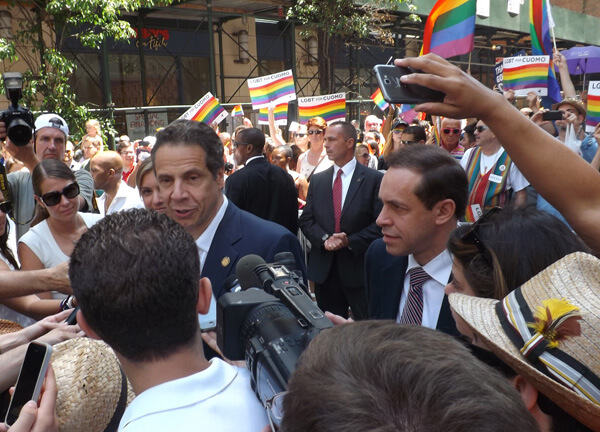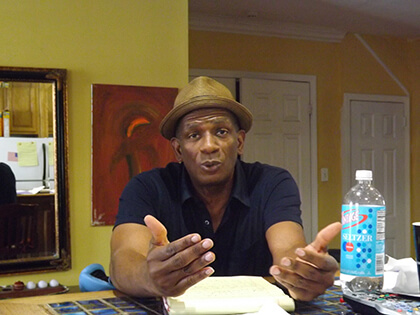Late in his book “Body Counts: A Memoir of Politics, Sex, AIDS, and Survival,” Sean Strub describes a dinner party he attended in 1992 on Manhattan’s Upper East Side. After a servant took his coat, Strub joined “several men already enjoying drinks; they were older and, I deduced, probably conservative and possibly closeted.”
During the evening, one of the men, Robert W. Wilson, made anti-Semitic and racist comments. He later disparaged people with AIDS and Strub began to argue with him. He eventually slammed his fist on the dinner table and said to Wilson, “One of these days you’ll open the New York Times and read that I’ve died of AIDS. When that happens, I want you to know it is people like you who killed me.”
It is the only such outburst that Strub describes in this 400-page book, which is remarkable given the battles Strub has fought in his life. After suffering a stroke in mid-2013, Wilson, 87, committed suicide in December.
Sean Strub’s memoir about AIDS and gay politics calls some to task, lets a few slide
“Body Counts” is a well-written and welcome addition to the histories of the queer and AIDS movements. It also details the considerable contributions Strub has made to those movements over the past 30 years.
Strub is probably best known as the man who modernized fundraising for gay and AIDS groups. He launched a direct mail firm that studiously compiled lists of donors and authored appeals that brought tens of millions of dollars into the coffers of those groups. But he also made contributions on policy matters and to community debates over policy.
The memoir opens with Strub participating in the 1989 demonstration that ACT UP held inside and outside St. Patrick’s Cathedral in Manhattan. It then quickly moves to his childhood in Iowa and his early interest in Democratic politics that led him to a page job in the US Senate.
Strub liberally distributes small details and nuggets of gossip throughout the book. We learn what Strub, raised a Roman Catholic, said when he accepted a Communion wafer during the ACT UP action. He tells us that Senator John Tower, a Texas Republican, was typically rude to the pages and that senators maintained a small private room in the Capitol where they could drink undisturbed.
Also attending the dinner party where Strub argued with Wilson was Andrew Napolitano, a former New Jersey judge who is now a commentator on Fox News. Given how Strub described the guests at that party — “probably conservative and possibly closeted” — I wondered if he had just outed Napolitano, who is unmarried.
The book’s later sections in which he describes learning that he was HIV-positive, living in the first years of the AIDS epidemic, and losing a partner, Michael Misove, to AIDS will be a difficult read for anyone who lived through that time, as Strub’s experience will be painfully familiar.
Strub is as harsh with some of his peers as he was with Wilson at that dinner party. He correctly chastises Bill Clinton, who held the White House from 1993 to 2001, for failing on AIDS policies as well as for supporting Don’t Ask, Don’t Tell and the Defense of Marriage Act, two laws that have since been ended. He does not spare gay groups.
When the Washington Post reported that Al Gore, Clinton’s vice president, had prevailed upon South Africa to not enact legislation allowing generic anti-HIV drugs to be used there at the behest of US pharmaceutical companies, the “gay establishment” acquiesced. Strub accuses gay groups of “selling out people with HIV in Africa and elsewhere.”
Where Strub falls down in his indictment is when he discusses his closest friends and what he published in POZ, a magazine he founded in 1994.
In 1997, POZ published stories on bareback sex in back-to-back issues. The first was a column by Stephen Gendin, who described having bareback sex with activist Tony Valenzuela. Both were HIV-positive. The cover line on the first issue was “BAREBACK SEX: Let the Debate Begin.”
The next issue featured a picture of Valenzuela naked on the back of a horse with the headline “They Shoot Barebackers, Don’t They?”
While the magazine’s posture was that it merely wanted to spark a dialogue, both stories were stupidly provocative. Given the uproar that the first caused, the second was a “Fuck You” that was aimed directly at people who were sincerely concerned with the state of HIV prevention and found the promotion of sex without condoms to be unhelpful. Strub writes that the Valenzuela cover was “attention-getting,” but he “regretted” publishing it.
“The clever wordplay and image fed the accusation that we were being sensationalistic rather than leading to a serious community discussion,” Strub writes.
Two years later, POZ published a “sobering follow-up” in paired stories by Gendin and his partner, Kyle “Hush” McDowell, in which they disclosed that Gendin had infected McDowell. Gendin, who died in 2000, wrote “Hush’s seroconversion is one of the few things in my life that I’m deeply ashamed of.”
Given the result — McDowell’s infection and Gendin’s shame — does this not require at least some introspection? Not to Strub. He likens how Gendin, POZ, and Valenzuela were treated to how Michael Callen, Richard Berkowitz, and Joseph Sonnabend were abused by some when they published “How to Have Sex in an Epidemic: One Approach.” That 1983 pamphlet advised gay men on how to avoid becoming infected. “It’s easy to shoot the messenger,” Strub concludes.
Strub is a smart guy and he was right to challenge the failures by Clinton and gay groups. He should have used his considerable intellect to examine some of his own actions.
BODY COUNTS: A MEMOIR OF POLITICS, SEX, AIDS, AND SURVIVAL | By Sean Strub | Scribner | $30 |432 pages



































